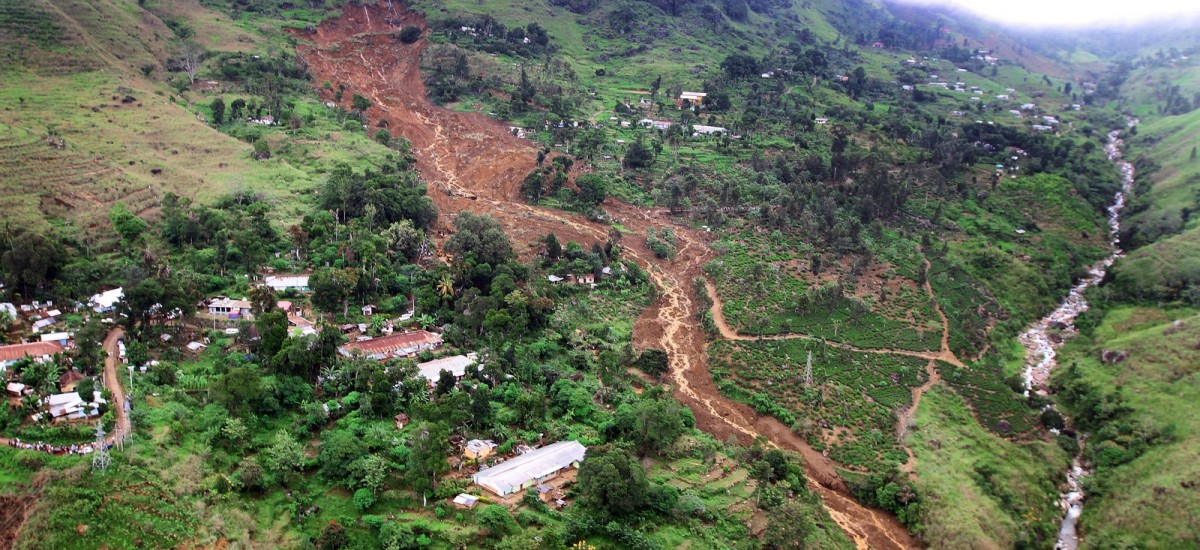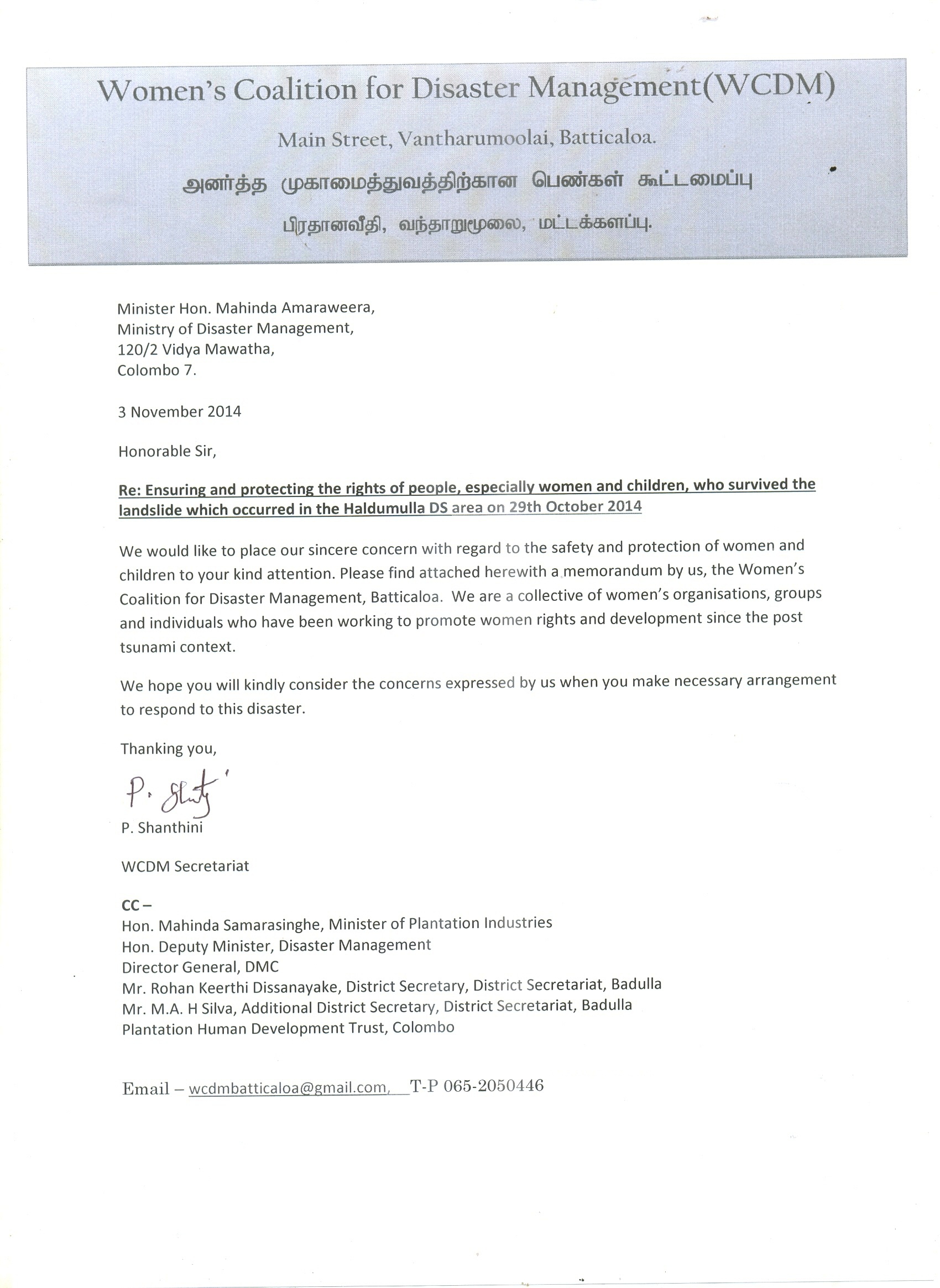Image courtesy Colombo Gazette
Memorandum to the Ministry of Disaster Management
Ensure and protect the rights of people, especially women and children, who survived the landslide which occurred in the Haldumulla DS area on 29th October 2014
As the Women’s Coalition for Disaster Management, Batticaloa, we wish to express our sincere condolences to the people who perished in the landslide disaster in the villages of Kotabathma Grama Niladhari division of Haldumulla Divisional Secretariat Division in the Badulla District. We also express our support to the people who survived. We deeply appreciate the commitment and work of all the government officials, civil society organizations and individuals who have responded to this tragedy.
There have been delays in recovering the bodies due to the unstable climate, as well as other challenges in responding to needs.In this context, it is the responsibility of all who are working for social development to protect the welfare and rights of the people who survived.
Disasters are not neutral. It always brutally affects the marginalized and impoverished people. This tragedy too has hit some of the most marginalized areas and people of Sri Lanka -the plantation workers of the Haldumulla DS division. In Sri Lanka and around the world, it has been seen that disasters also have very gendered impacts – affecting women and men, girls and boys differently. As organizations who collectively worked and supported women and children during the tsunami disaster in Batticaloa, based on our experience we would like to share our suggestions for ways to reduce the impacts on the most vulnerable survivors.
Information
- Have information available as soon as possible about names and other relevant details of those alive and where they are so that there is proper communication to relatives. This information should be easily accessible through information centers set up in places easily accessible by the relatives, such as on the side of the road near the affected sites.
Search and rescue work
- Only few bodies had been recovered to date – the families with missing members need support/solidarity to help them through this difficult time. The search should continue till the last body is found, as this is culturally very important for grieving and can have long-lasting effects.
- We have already seen in other countries where such disasters have happened there is a slim chance that a few people may have survived. In the recovery attempt,it is very important,in additional to the work using heavy machinery,to use sophisticated technology and alternative methods to find anyone who may still be alive.
- It is very important for the community, particularly women, to be involved in the recovery process as well as decision-making processes at the camp and community level. This will benefit the recovery process as well as ensure sustainability of these efforts. Community members have very valuable local knowledge and are familiar with the environment. Special efforts must be taken by recovery coordinators to enable women (and other often marginalized groups) to participate.
Relief
- Though there is food and shelter and other facilities provided, women need designated protected places to change clothes, to sleep and to feed babies.
- Timely and clear information must be made available to women and children to avoid confusion, fear and dependency on rumours and dominant figures in the affected areas. This is particularly important in relation to registering people, health clinics, theprovision of rations, legal status, compensation prospects and future administrative plans for the affected people.
- Special measures to meet women and girls reproductive health needs must be put in place, and we recommend health clinics must be held in all locations preferably with an all-female medical team.Special attention must be given to the needs of pregnant and feeding mothers.
Special measures for protection of women and girls
- Special measures should be put in place to protect children and young women as they are more prone to abuse during the times of disaster. This is a particular concern due to the vulnerability of plantation workers. This includes for example, forming women’s groups, providing electricity and having well lit areas, transparent procedures to access relief, and regular presence of mobile police units including the women and children desk police officers. During situations of stress and uncertainty for the community, it is important to be vigilant about risks of domestic violence as well as exploitation by outsiders (including those providing assistance). Separating children and young women from their trusted caregivers or siblings may increase their vulnerability and should be avoided.
Language
- The DMC officers and Army are mostly Sinhala speaking, the community is Tamil but mostly bilingual. Needs assessment, involvement in decision-making and provision of support needs to happen in the language that the affected families are most familiar with, particularly when dealing with children.
Psychosocial wellbeing
- We wish to reiterate that all the above measures will have profound benefits for the psychosocial wellbeing of women and others who have suffered terrible losses due to the landslide. Placing women’s concerns at the center of decision-making processes will enhance their ability to cope and recover, and will prevent secondary psychosocial impacts. If persons are identified who are too distressed to care for themselves or others, then support should be provided through trained psychosocial workers or mental health staff who are based in the area. Single-session counselling by short-term visitors or volunteers who will not be able to follow-up must be avoided.
Responsibility of Plantation managements
- The Plantation Managements are also responsible to provide the details of householders in their records and also for the rehabilitation and resettlement of these families in safe locations.
Land and housing rights
- The most important issue is that these communities are given land and housing in safe areas where their livelihoods are secured. The livelihoods of these communities are intertwined with the estate sector so they must be given dwelling places in or near the relevant estate, but in locations earmarked as safe for construction. Since they are citizens of Sri Lanka the Government must allocate land for them and provide assistance for housing and compensation for their losses.


